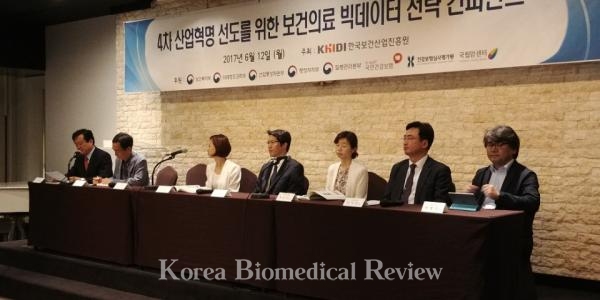Drugmakers are raising their voices to ease regulations so that they can make better use healthcare big data at public organizations for developing new drugs.
The big data currently supplied are mostly those oriented to the needs of academics or suppliers, not very suitable for industrial use, they say.
The domestic pharmaceutical industrialists put forth these and other demands at a conference hosted by Korea Health Industry Development Institute (KHIDI)한국보건산업진흥원 Monday at Seoul Palace Hotel Monday.
“The government must come up with ways to open data to the industry not just for research purpose but for using them in development new drugs,” said Eum Seung-in, a director at Korea Pharmaceutical and Bio-Pharma Manufacturers Association(KPBMA) 한국제약바이오협회. “There are needs from various sectors within the industry to make the most of the big data.”

According to the results of a demand survey by the institute, the pharmaceutical industry wants to use the healthcare big data for five specific purposes --finding out other indications, developing incrementally modified drugs, selecting patient groups with high drug efficacy, developing new drug targets with the potential of controlling risks through studying the side effects of the existing medicines, and researching anticancer therapies and rare diseases.
Pharmaceutical companies that have used part of the medical claims data at Health Insurance Review & Assessment Service (HIRA)건강보험심사평가원 to develop new drugs also stressed the need to diversity information to be used by the pharmaceutical industry.
“We have used some HIRA data to develop the therapy of gastroesophageal reflux disease at an elementary level, but heard few other companies asked for the data. HIRA examined the matter in forward-looking ways and provided publicly available data through screening,” said Kim Ki-ho김기호, an executive director at CJ HealthcareCJ헬스케어.
CJ Healthcare has used the HIRA data to get information on the existing drugs’ treatment method and period, conducting the demographic analysis by indications, region and age for registering patients for clinical trials, and predicting the number of patients for three years after registering new drugs.
The CJ executive also said the healthcare big data also helped it license out. CJ Healthcare signed a contract to export technology of CJ-12420 (Tegoprazan), a new drug to treat gastroesophageal reflux disease, with a Chinese pharmaceutical counterpart Luoshen. The drug has completed clinical trials in Korea and is undergoing the screening for approval.
“When making the licensing-out contract, the Chinese company asked us to submit documents about its safety and efficacy, but we didn’t have objective data to prove them,” Kim said. “We worked out extraordinary reactions based on the data at Korea Institute of Drug Safety & Risk Management(KIDS)한국의약품안전관리원 and HIRA, and succeeded in exporting the technology.”
Kim expressed regrets, however, that the appropriate scope of data by the industry is far smaller than that by the academic circles for research purpose. "I hope they will open data to the industry without discrimination and to the extent of not passing the bounds of ethic,” he added.
In the conference, the participants agreed on the need to make the most of the healthcare big data, but some pointed to ever-present risks of data hacking and leakage.
"Medical data, too, are food for hackers. The information protection of the healthcare big data is possible only when they meet the obligations of private information protection, cloud information protection, and strict standards for the storage and management of electronic records," said Professor Han Keun-hee한근희 of Korea University Graduate School of Information Security.
"When healthcare big data are used to develop new drugs and produce medicines, they should be managed from the aspect of protecting industrial secrets, too,” Professor Han said. “I have inspected the production line of a drugmaker, in which they produced one drug by mixing 16 compounds. If they reversed manufacturing processes, the drug could be a poison. The problem is such the carbon copies of such an important information were going around within the company without any regulation."
The Ministry of Health and Welfare (MOHW)보건복지부 said it would pursue a balanced policy with the focus on three values; protecting private information, improving public health and communicating with people.
“To substantiate medical services that make the most of the healthcare big data, we should take follow-up measures by all means,” said Yang Sung-il양성일, director general of the Bureau of Heath Industry. “We will activate a working-group team to share the data and produce meaningful outcomes by making priorities from the standpoint of enhancing public health.”
Cooperation from related government agencies is essential for pushing for healthcare big data strategy, the official said. “Our ministry will try to substantiate the discussion until they become tangible,” he added.

